FMF i inne Festiwale Muzyki Filmowej oraz Koncerty
Re: FMF i inne Festiwale Muzyki Filmowej oraz Koncerty
To chyba najsłabszy FMF od wieeelu lat, a może i ever.
Gdyby nie piraci, byłbym jak Zbigniew Hołdys - Eric Clapton.
- Ghostek
- Hardkorowy Koksu
- Posty: 10593
- Rejestracja: śr kwie 06, 2005 23:17 pm
- Lokalizacja: Wyłoniłem się z Nun
- Kontakt:
Re: FMF i inne Festiwale Muzyki Filmowej oraz Koncerty
To już od dawna robi się dorocznym zjazdem funfli od ASCAP. Z drobną rotacją wśród bardziej prestiżowych gości.

-
hp_gof
Re: FMF i inne Festiwale Muzyki Filmowej oraz Koncerty
Dżoneł, Carter i Olek będą dyrygować, Hans nie umie dyrygować i nie ma czego dyrygować, więc będzie siedział z Wallfischem przy keyboardzie, Jonny jest takim hipsterem, że kompletnie olał imprezkę 
http://www.thegoldknight.com/2018/02/os ... -hall.html
http://www.thegoldknight.com/2018/02/os ... -hall.html
- Koper
- Ennio Morricone
- Posty: 26704
- Rejestracja: pn mar 06, 2006 22:16 pm
- Lokalizacja: Zielona Góra
- Kontakt:
Re: FMF i inne Festiwale Muzyki Filmowej oraz Koncerty
O, i ma u mnie plusa
"Hans Zimmer w tej chwili nic nie potrzebuje. (...) Ciebie też nie potrzebuje." - Paweł Stroiński
Re: FMF i inne Festiwale Muzyki Filmowej oraz Koncerty
z tego co wyczytałem w wywiadzie bodaj w Variety, to ma zobowiązania koncertowe, co naturalne jak się jest w takim bandzie... może go nawet nie być na ceremonii. Hansa nie było na Bafta.
NO CD = NO SALE
-
hp_gof
Re: FMF i inne Festiwale Muzyki Filmowej oraz Koncerty
Deakinsa też nie było na BAFTAch, bo kręci film w Nowym Jorku. Normalka. Ale na Oscary potem wszyscy jakoś czas zazwyczaj znajdują 
-
hp_gof
Re: FMF i inne Festiwale Muzyki Filmowej oraz Koncerty
Oscar-nominated composers embrace their rare moment on stage
LOS ANGELES (AP) — It's not often that a composer is asked to provide musical accompaniment to a woman having sex with a fish monster. It's almost as rare that a composer is asked to conduct a big-city symphony in a performance of his movie score the same week he's expected to win an Oscar for it. Alexandre Desplat, whose music gave voice to the emotions of the mute couple at the center of "The Shape of Water," embraced both tasks. He was one of five Academy Award nominees whose scores the Los Angeles Philharmonic performed Wednesday night at Walt Disney Concert Hall in a show designed to give usually secluded composers a rare moment in the spotlight. It was just the second such concert in the history of the academy, which celebrates its 90th anniversary with Sunday's Oscar ceremony.
"It's a fantastic moment for a composer to be able to come out of your studio and share the emotion," Desplat, 56, told The Associated Press shortly before taking the stage. "It's a great reward, especially here, with this orchestra."
Guillermo Del Toro, who directed the film, was in attendance Wednesday night and spoke briefly to introduce Desplat to the crowd. When Del Toro presented him with the amphibious and very adult love story, Desplat said his thought was: "Give me more sex scenes." And he knew what approach he wanted to take: as pure, sweeping and romantic as he would give to any passionate relationship.
"I haven't scored that many love stories," Desplat said. "It's one of my rare opportunities. There are not so many movies that are love stories anymore."
He set aside the conductor's baton and used only his hands to lead the orchestra in a transfixing performance of his score, a classic movie-romance with an occasional accordion that evoked his native Paris, and just the slightest nod to the movie's supernatural themes. While he has spent his entire career in movies, and won an Oscar for 2014's "Grand Budapest Hotel," he has also occasionally led an orchestra in concert.
Carter Burwell hasn't. The composer for "Three Billboards Outside Ebbing, Missouri," has had a storied three-decade career in movie music, but had never before taken the concert stage to conduct. "Oh it's completely new," said Burwell, showing no sign of nerves before the show. He was resplendent in a tux and slightly oversized white tie when he led the orchestra in his spaghetti-western-style soundtrack to "Three Billboards," giving no indication that he was a rookie.
Jonny Greenwood, the Radiohead guitarist and keyboardist who scored "Phantom Thread," was the lone no-show nominee, though his work was played in his absence.
The night had a rock star anyway in 86-year-old John Williams, who was welcomed with whoops and cheers more common in arenas than concert halls. Williams' Oscar nomination for "Star Wars: The Last Jedi" is his 51st. Williams was introduced by Rian Johnson, the "Last Jedi" director who said it's impossible to present Williams to an audience without sounding "too grandiose, like I'm dedicating a national park." On this night, however, Williams focused only on material that was new and unique to "Last Jedi," and stayed away from the soul-stirring "Star Wars" melodies.
The last of the composers, Hans Zimmer, wasn't happy Wednesday night. The 11-time nominee was certainly glad the Academy was giving added attention to composers. But he really wished they hadn't done it in a year when his entry, the score for "Dunkirk," was designed to make an audience feel edgy and claustrophobic, instead of, say, 1995, when he won an Oscar for his crowd-pleasing work on "The Lion King." "Why couldn't it have been any other year?" he moaned, with a bit of a laugh behind his agony. And when he heard the order of performers, it got even worse. "They made us go alphabetically," Zimmer said. "I think there's something completely and utterly wrong about me following John Williams."
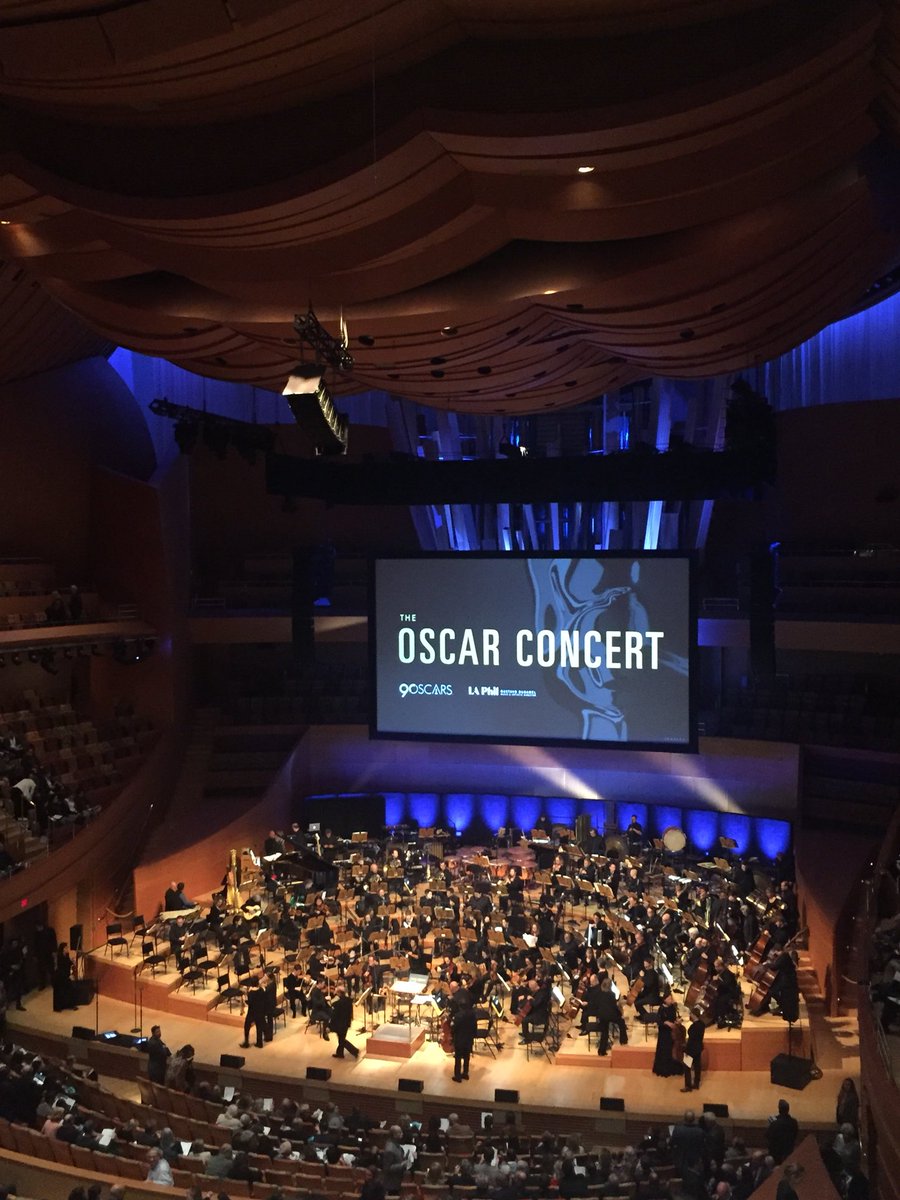
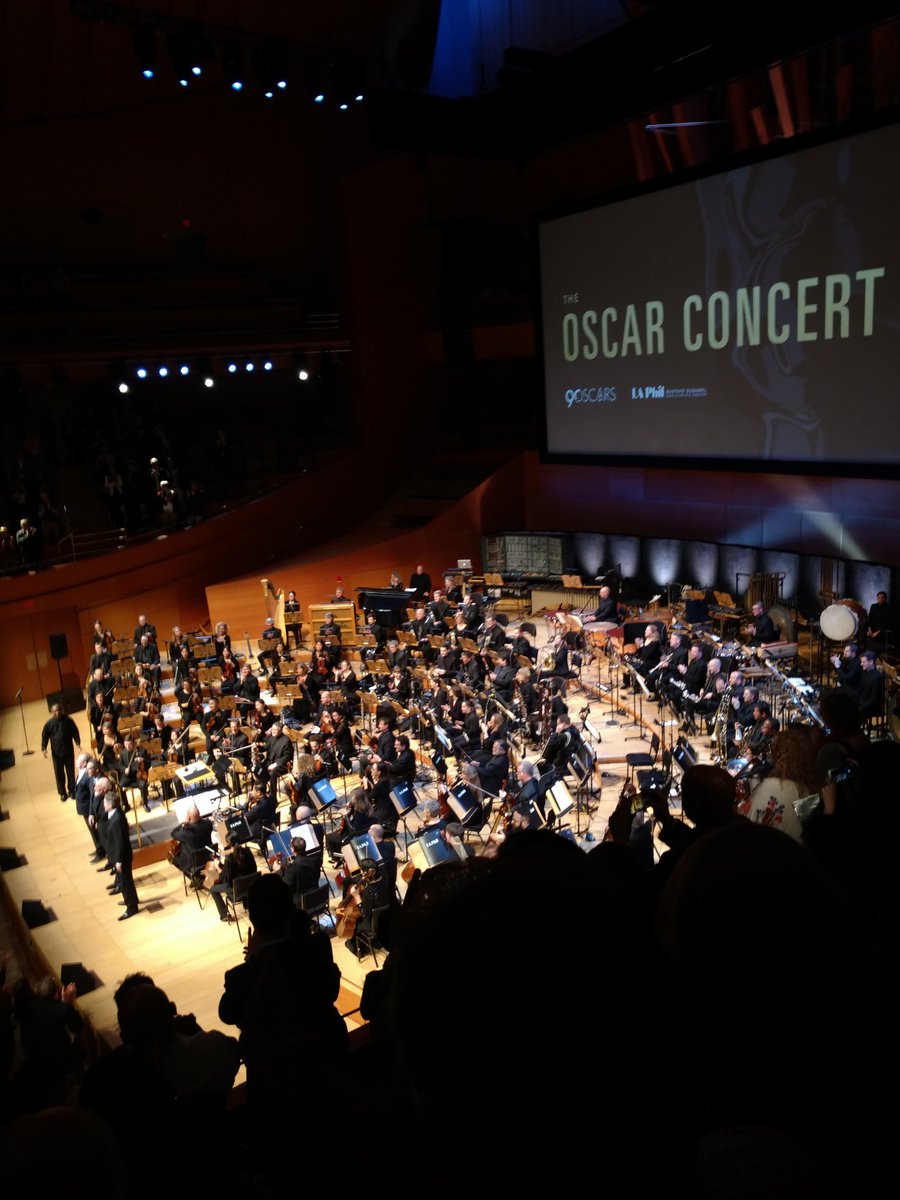
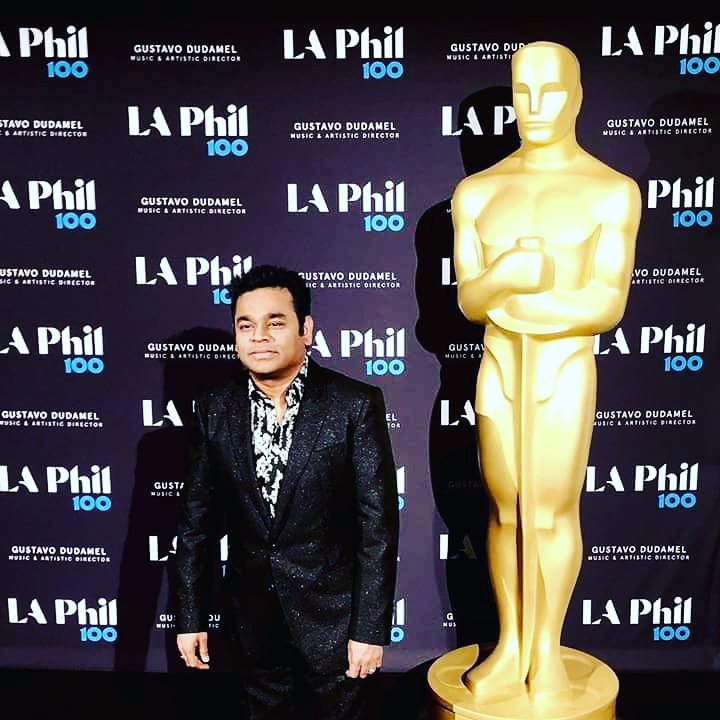
Ostatnio zmieniony czw mar 01, 2018 09:59 am przez hp_gof, łącznie zmieniany 2 razy.
-
hp_gof
Re: FMF i inne Festiwale Muzyki Filmowej oraz Koncerty
Nie tylko, cały czas szukam i aktualizuję  Dodałem ciekawy artykuł-relację z koncertu (dwa posty wyżej)
Dodałem ciekawy artykuł-relację z koncertu (dwa posty wyżej) 
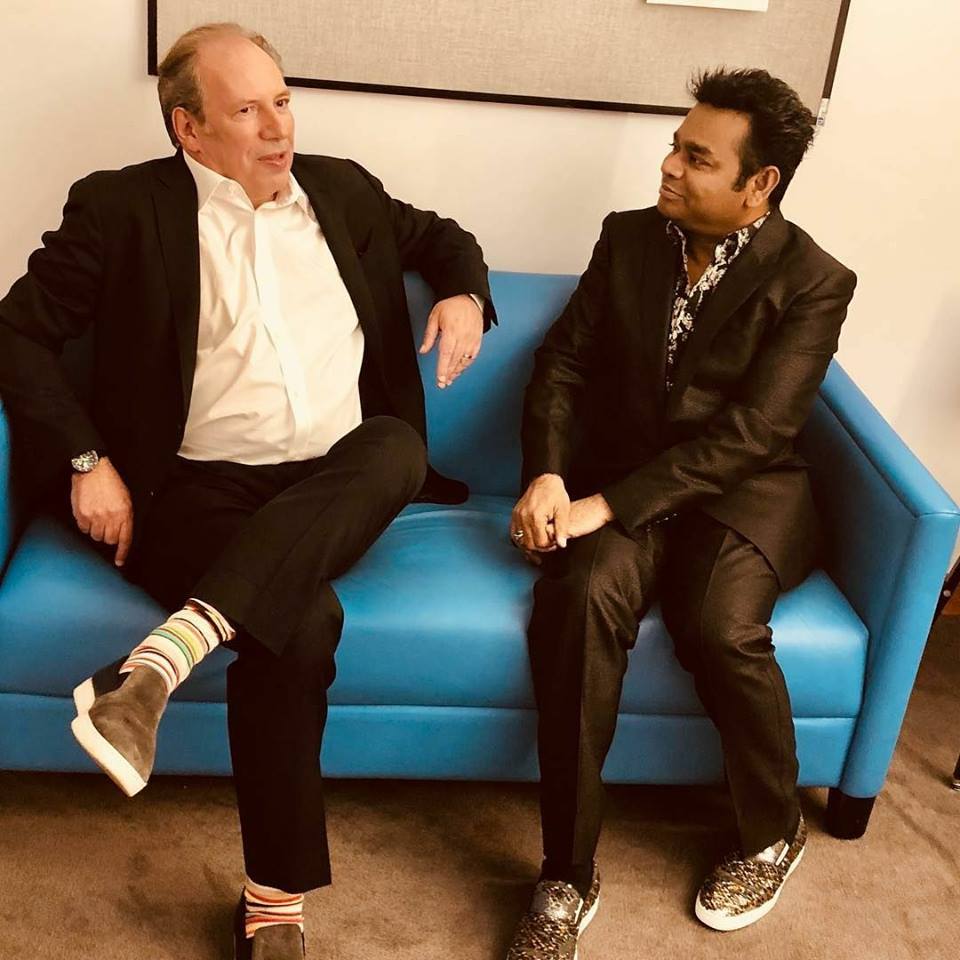
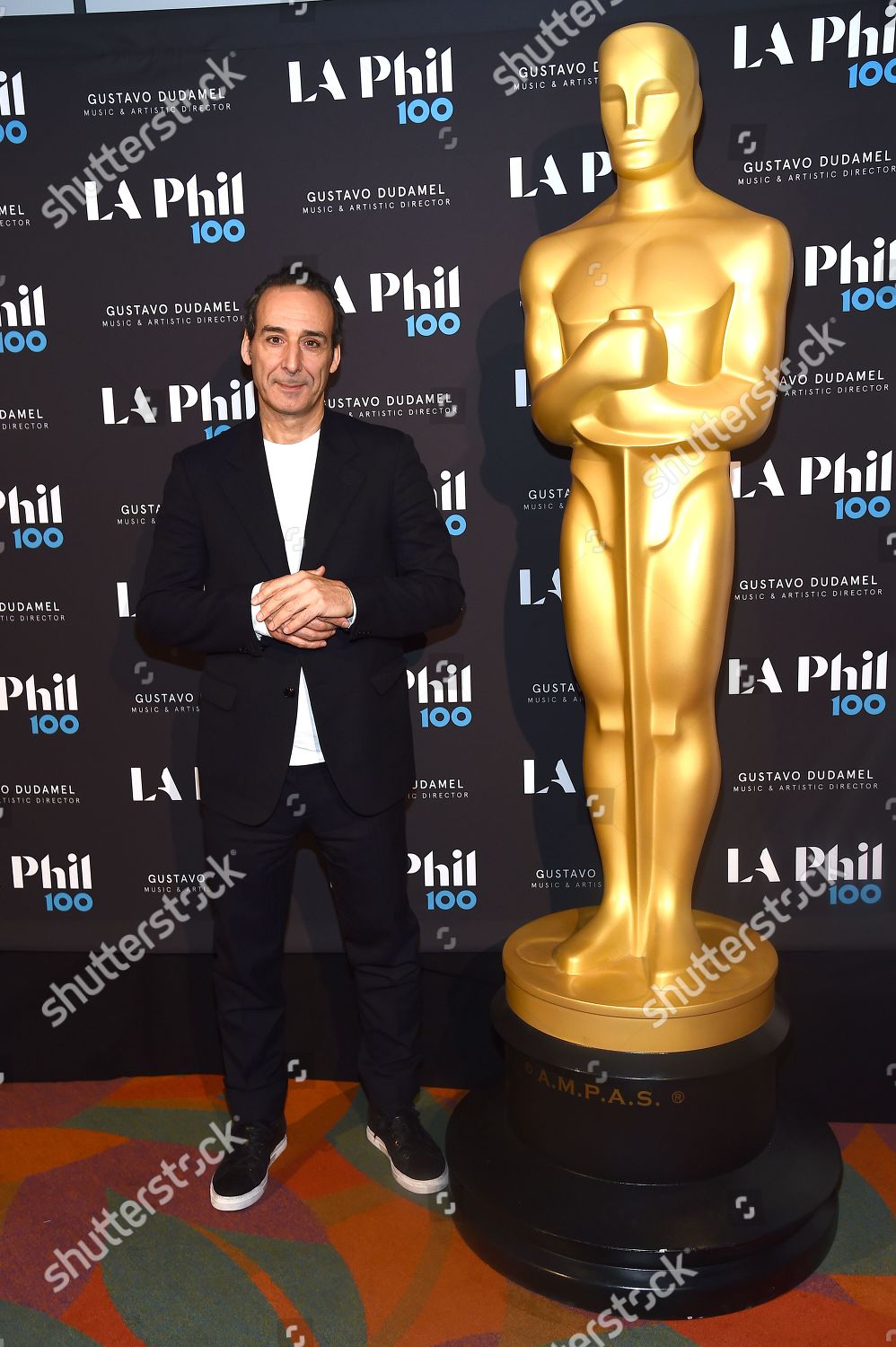










-
hp_gof
Re: FMF i inne Festiwale Muzyki Filmowej oraz Koncerty
Krótki fragmencik z Odlotu:
https://twitter.com/DisneyExaminer/stat ... 9563863040
https://twitter.com/DisneyExaminer/stat ... 9563863040
-
hp_gof
Re: FMF i inne Festiwale Muzyki Filmowej oraz Koncerty
Tutaj są wszyscy czterej na scenie, ale słabo widać, trza czekać na lepsze.
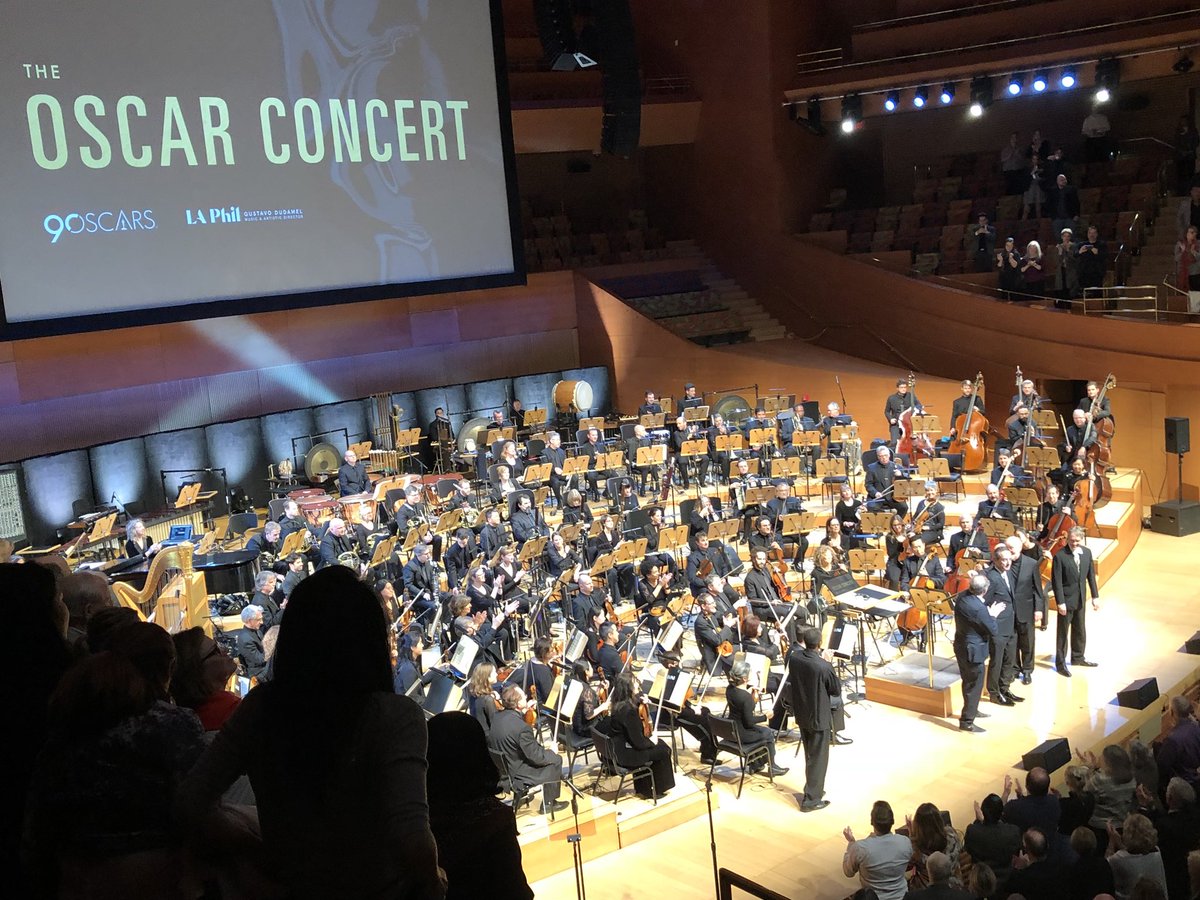

Re: FMF i inne Festiwale Muzyki Filmowej oraz Koncerty
widze że kolejną rzecz całe Hollywood zgapia od Hansa - nagle prawie wszyscy kochają wsuwane tenisówki 
NO CD = NO SALE
-
hp_gof
Re: FMF i inne Festiwale Muzyki Filmowej oraz Koncerty
Kolejna obszerna relacja z koncertu
https://www.thewrap.com/academy-takes-d ... r-concert/Academy Takes Over Disney Hall for Spectacular Oscar Concert
The L.A. Philharmonic does an exceptional job performing music from the five nominated scores in front of Guillermo del Toro, Paul Thomas Anderson, Common and others
Three directors, four songwriters, four composers, a handful of publicists and dozens of Oscar voters were on hand for a gala gathering on Wednesday night at Walt Disney Concert Hall in downtown Los Angeles – but for the first time in months, that collection of people came together on a night that involved no Oscar campaigning whatsoever.
That’s because voting ended on Tuesday, making Wednesday’s “Oscar Concert” an event that couldn’t be anything but a showcase and celebration of the five Oscar-nominated scores. The show was performed by the Los Angeles Philharmonic in the grand surroundings of Disney Hall, in front of an audience that included Oscar song nominees Benj Pasek, Justin Paul, Diane Warren and Common.
The concert was part of a three-year alliance between the Academy and the Philharmonic, which began last year with the presentation of “Rebel Without a Cause,” “On the Waterfront” and “Casblanca” with live orchestral accompaniment. At a post-concert reception, L.A Philharmonic CEO Simon Woods and Academy CEO Dawn Hudson let it slip that the partnership will culminate next year with the Philharmonic performing live on the Academy Awards, conducted by its celebrated artistic and musical director, Gustavo Dudamel.
Wednesday’s was the second Oscar-week concert devoted to nominated music, with the first taking place in 2014 at Royce Hall on the UCLA campus. But moving to Disney Hall and enlisting the LA Phil, one of world’s greatest and most adventurous orchestras, moved things to a whole new level.
This was also a wildly ambitious program, and one that music-branch governor Laura Karpman said has been in the planning stages since last summer. The first half of the show, curated by Karpman and her fellow governors Michael Giacchino and Charles Bernstein, was dedicated to film scores throughout history, separated by genre and accompanied by film montages: one for “the sound of love,” one for “the sound of fear,” one for “the sound of home,” etc.
These suites, conducted by Thomas Wilkins, typically took music from three or four classic scores and illustrated it not just with scenes from those movies, but from lots of other movies, too. In the “Sound of Home” segment, for example, Nino Rota’s music for “Amarcord” played over scenes from that movie along with “The Lord of the Rings: The Fellowship of the Ring,” “The Last Emperor,” “Dances With Wolves,” “The Sound of Music,” “Parenthood” and several others.
Later, Erich Wolfgang Korngold’s Oscar-winning music for 1938 Errol Flynn swashbuckler “The Adventures of Robin Hood” was also used under scenes from “Casablanca” and “An American in Paris,” Luis Enriquez Bacalov’s “Il Postino” score replaced James Horner’s music from “Titanic,” and Mica Levi’s creepy music for “Jackie” was dropped underneath scenes from “The Shining” and even “Jaws.”
It made for entertaining clip packages, even if it was a bit odd to find an evening devoted to film music essentially making the case that music written for one movie is eminently adaptable to another, and that images we association with one composer can work with the music of a different composer.
But really, the idea was to have fun with mood and genre and to let the Philharmonic show off its range and versatility. The clips also posited an alternate view of movie history, with far more foreign films and movies with diverse casts than you’d typically find on a reel of Oscar-recognized films. Make no mistake, an Academy branch that was once known for being extremely heavy on white men of an advanced age is working hard to present a message of diversity.
If the first half of the show was fun, the second half was the real point of the Oscar Concert. The five nominated scores were introduced by the films’ directors – Guillermo del Toro, Paul Thomas Anderson and Rian Johnson in person, Martin McDonagh and Christopher Nolan on video – and four of them were on hand to either conduct or perform five-to-10 minute selections from their films. The fifth, “Phantom Thread” composer Jonny Greenwood, was not present, but his music was performed.
For this section, the video screen was not used; we heard the music without seeing the images for which it was written, which marvelously put the focus squarely on five exceptional scores and one exceptional orchestra.
It opened with Carter Burwell’s lovely, evocative and slightly unsettling score to “Three Billboards Outside Ebbing, Missouri.” Burwell’s suite, which he conducted, ended with soprano Liv Redpath performing a ghostly version of the transcendent early 19th century Irish song “The Last Rose of Summer,” which spotlighted one of the true strength’s of Burwell’s score: the way it is perfectly interwoven with the canny selection of songs that McDonagh uses in the film.
Alexandre Desplat’s “The Shape of Water” score, which followed, was delicate and ravishing; as del Toro pointed out in his introduction, the film’s two main characters don’t speak, so he relied on Desplat to give them a voice.
Introducing the “House of Woodcock” theme from Greenwood’s “Phantom Thread” music, Paul Thomas Anderson said he asked the Radiohead guitarist to “write some music like Nelson Riddle would,” figuring that the combination of that 50’s composer’s style and Greenwood’s “British, depressed and atonal” approach would yield something interesting. Which, of course, it did: The “Phantom Thread” music is gentle and elegant, but with an uneasy sense that something’s not quite right.
It was followed by 51-time nominee John Williams, who got the night’s biggest ovation from the audience and from the orchestra simply for walking onstage – and another ovation for the richly dramatic “Star Wars: The Last Jedi” cue “The Rebellion Is Reborn.”
“John is a legend, but he doesn’t work like a legend,” said director Johnson. “He works like a little kid sprinting toward a playground because that’s where the toys are.”
And while you might think it’d be tough to follow John Williams, Hans Zimmer did just that with the monumental “Home” from “Dunkirk.” Nolan said he wanted music that was completely integrated with the film’s sound effects and picture, and in fact the composition began with aircraft noises before building to a deep, massive and doomy throb that became bigger and bigger before yielding to a beautiful, yearning and melodic coda.
It brought the house down without detracting from anything that had come before it. Instead, the entire post-intermission section was simply a vivid showcase for the orchestra’s versatility, and a spectacular listening experience that flowed from the acoustic intimacy of “Three Billboards” to the metallic thunder of “Dunkirk.”
And while seeing Dudamel and the Philharmonic on the Oscar stage next year will no doubt be a treat, the real lesson of Wednesday’s Oscar Concert was that the Academy shouldn’t wait another four years to do this again. Instead, they should immediately book that hall and sign up that orchestra for an encore next February.
